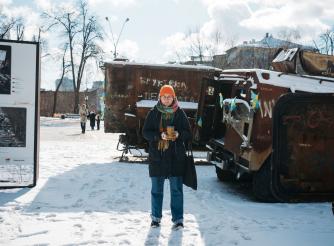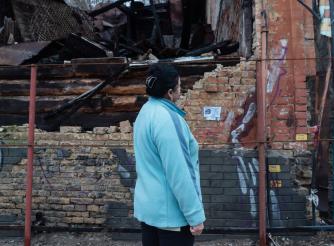Gender Based Violence in Ukraine: The Tip Of The Iceberg
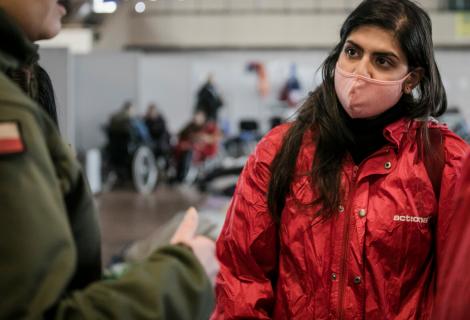
Gender-Based Violence, including sexual violence is a widespread instrument of war, even if it remains invisible. In the case of Ukraine, the UN has already registered 124 complaints of sexual violence alone, but this is only the tip of the iceberg, as many women are too afraid to report incidences. Impunity and revictimization could be the main reasons for the under reporting of cases, among others. Rape, forced pregnancy, human trafficking and other sexual abuses become a tactic of control and humiliation for the victims in wars, and also an instrument for the moral breakdown of the adversary. For women and girls, it becomes a scar that may not be visible but embedded in their minds and determines their personality and recovery from the conflict.
ActionAid, currently working on the response to the Ukrainian war, emphasises that it is essential to provide the necessary assistance and accompaniment to survivors of Gender-Based Violence including sexual violence, both within Ukraine and in the countries where they seek refuge. However, in many cases, public services in those countries do not guarantee essential services, such as clinical management of rape, for various reasons: lack of means and adequate protocols, lack of skills and knowledge, or, as in the case of Poland, very restrictive policies regarding the sexual and reproductive health and rights of women and girls, which is a serious obstacle for the victims. In fact, the ban on abortion in this country resulted in refugee women being forced to return to Ukraine in search of an abortion, before fleeing the war again.
In the case of Ukraine, it is also difficult to find centres where clinical management of rape is performed, compounded by the fact that many women prioritise other needs and those of others, such as their dependents, over their own. It is therefore imperative to keep analysing how diverse women experience Gender-Based Violence in the conflict and more critical from the voices of the affected women themselves.
“Shame and fear cause a large number of cases to remain invisible and under-reported, a situation that is aggravated if the victims have no resources and no information on available services. Unpleasant previous experiences with service providers do also play an important role,” says Atria Mier, gender specialist and ActionAid´s Senior Emergency Manager for Moldova and Ukraine.
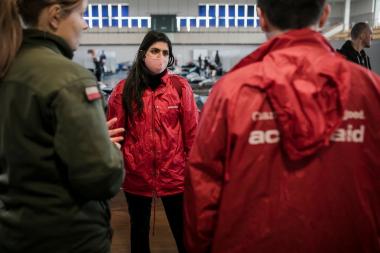
It is necessary for the personnel of organisations and border officials to know how to attend to a person who may have suffered sexual violence and/or Gender-Based Violence and to know how to refer them to the appropriate services. In this sense, ActionAid advocates for survivor centered approaches where women are deciding by themselves on their options and confidentiality, safety and dignity are preserved. Investment on capacity building for frontline staff is key during the response as well as part of the recovery process.
Referral pathways for survivors continue to have many shortcomings in countries neighbouring Ukraine, such as Poland. In the case of Clinical Management of Rape (CMR), one of the first steps is to provide the survivor with post-exposure prophylaxis (PEP) within 72 hours. It is within the protocol to administer antiretroviral therapy and antibiotics, with the aim of avoiding sexually transmitted diseases and other infections, and to provide the emergency contraceptive pill[1]. However, the so-called PEP kits are not widely available, nor is specialized medical care guaranteed in the host countries, including the forensic examination and the survivor-centered approach.
Furthermore, Trafficking in Persons (TiP) in conflict situations, also considered as sexual violence, is a severe protection risk in this conflict, especially for women, girls and those most marginalised, and it was a crime already widespread in the region before the war. That is why it is essential to secure the routes along which they move and experts who know how trafficking mafias operate in countries such as Romania, a country from which an estimated 60% of human trafficking victims in the European Union originate, according to a report by GRETA (Council of Europe’s Group of Experts on Action against Trafficking in Human Beings).
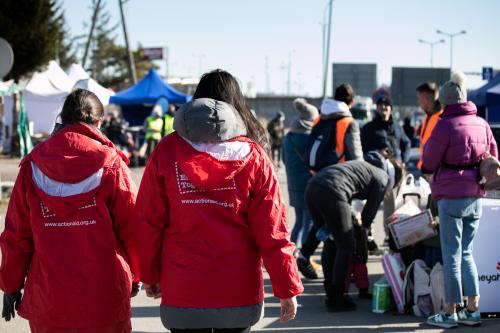
ActionAid is working with feminist and women-led organisations to respond to the emergency in Poland, Romania, Moldova and Ukraine. Part of the actions focus on reinforcing women’s leadership and agency in decision making while ensuring care for women, girls and LGBTIQ+ persons who have suffered sexual and Gender-Based Violence through multi-sectoral services (health, psycho-social support, legal aid and unconditional cash transfer) in their own language. These organisations also provide safe spaces and 24/7 hotlines that are community based.
ActionAid also supports and shares the demands of these organisations to urgently establish prevention, attention and recovery mechanisms for survivors of sexual and Gender-Based Violence, from a culturally appropriate way and with a survivor-centered approach that helps victims become survivors.
It is also important to note that Ukraine, Poland, Romania and Moldova are signatory to the 1325 UN Resolution on women, peace and security, and have developed National Action Plans. The feminists and women’s movements and AAS can work together on the women, peace and security agenda holding member states accountable to protection and prevention of sexual violence in conflict.

